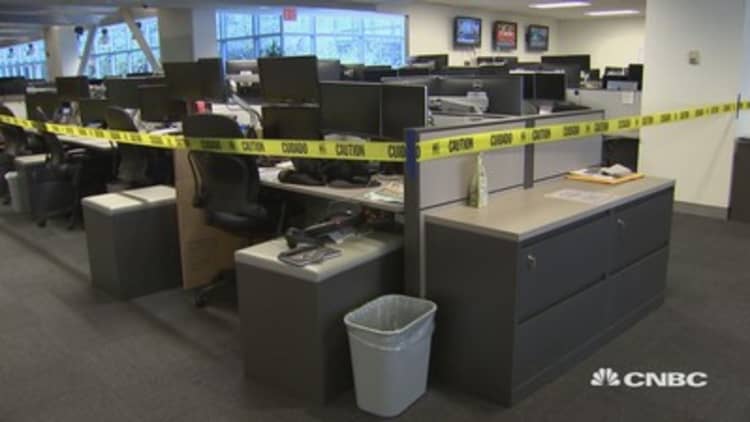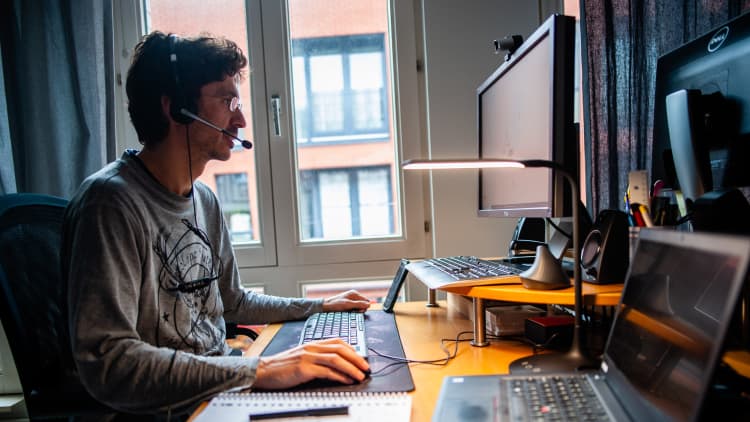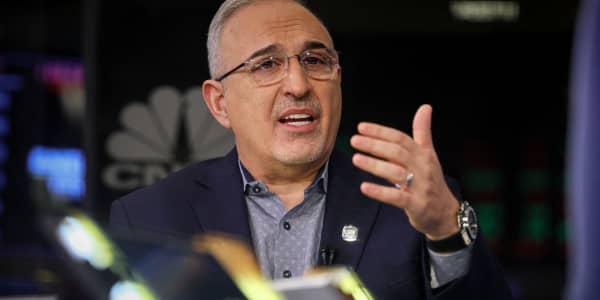By now it's very clear that the coronavirus pandemic will change the way we work in offices — perhaps indefinitely. Less certain is the impact these physical and structural changes will have on corporate culture, which has become an intangible asset that companies now long to perfect. Corporate culture can also be used to describe the warm feelings employees have or the high expectations of a company's management team.
"Think of it as safe, not sad," explains Marc Spector, a fellow of the American Institute of Architects and principal at Spectorgroup, referring to the measures companies will need to implement in order for employees to return to the office in a post-pandemic world. He emphasizes the aim for a greater focus on health and welfare and less so on "togetherness." The New York-based global architecture, interior design and master planning firm's portfolio includes such high-profile properties as Brookfield Place, 60 Wall Street and the Nikon USA Headquarters.
"Companies are going to have to reorient workstations so people aren't facing one another. That may mean changing where the computer is or where the power source is located. Companies are going to have to remove all of the tabling and the seating in conference rooms or other communal areas to give greater flexibility to space distance. Any personal effects at desks or offices need to be removed. That way, these spaces can be completely and thoroughly cleaned," says Spector. He also recommends companies institute measures like touchless entry for restrooms and elevators and voice-over Internet Protocol, or VoIP, so there will be less direct contact with various surfaces.

A turning point in corporate culture
The office of the future post-pandemic may resemble more a place out of a dystopian movie, leaving some to worry this may have a massive impact on employee morale and corporate culture. Others believe the new normal will be more positive.
Corporate culture is the secret sauce that builds the loyalty and trust workers have for their employer and defines the nature of an organization. It's the ephemeral feeling that CHROs and chief people officers speak of and work feverishly to build at their corporations.
Up until recently, it was built within the confines of a company's office. The pandemic will likely change corporate culture at most companies long-term as businesses contend with a more remote workforce that lack the ability to connect in one room or even, in some circumstances, face-to-face. While it may keep workers safe, it will likely feel more sterile, less connected and perhaps involve fewer chances for employees to grow.

Statistics are already starting to bear this out. According to an April survey conducted by the Society for Human Resource Management, 2 out of 3 employers say that maintaining employee morale during the pandemic has been a challenge, particularly companies that have 500 employees or more. One third of companies say they found maintaining company culture difficult during the pandemic. And while employers may be sensing a dip in morale, employees might just be happy to have a job during the pandemic. According to the Q2 CNBC/SurveyMonkey Workforce Survey, workers are happier with their jobs than they were pre-pandemic, yet more than half (54%) say their jobs have become increasingly more difficult.
On the flip side, some companies are finding strength from their culture, having been able to successfully navigate during these times. "We use our culture to frame it. We always had a collaborative culture and a supportive one. We are engaging our employees more than ever," explains Tracy Keogh, CHRO at HP. "We are an agile culture, and we pivoted to the needs of our employees. I also think this situation made us do things over a matter of weeks that might have taken us years otherwise to do."
HP is engaging with their workforce in a number of ways, through informational sessions and weekly Zoom-based town halls with doctors who can provide the latest updates on the coronavirus and other health-related issues, along with weekly homeschooling seminars for parents.
"We make sure that managers check in with their teams constantly and connect with them in different ways. Zoom is also a big game changer for us. Our CEO used to barnstorm around the world to meet with teams, but now through a series of Zoom calls, he can reach everyone and speak directly with them. We are seeing that people are able to connect more globally, and we are seeing that there are ways to be more inclusive with their employees by meeting them where they are," says Keogh.
But meeting your employees where they are doesn't always make up for chance meetings and unexpected moments that help a team or a department gel with one another.
According to Andy Molinsky, organizational and cross-cultural psychologist at Brandeis University, there are a lot of serendipitous meetings and conversations that take place in the office — like catching someone in the hallway or at the watercooler to ask them a quick question — that won't be happening with a remote working experience and digital landscape. "Now it's sort of distant and disengaged," he said.
Spector of Spectorgroup agrees: "Employees are being productive from home, but the sense of community and connection is what is most missed. Impromptu casual conversations aren't happening and have been replaced with more task-driven conversations."
Positive change requires bold, firm leadership
Michelle Penelope King, a gender-equality expert and author of "The Fix: Overcome the Invisible Barriers That Are Holding Women Back at Work," says the workforce right now requires some very strong leadership skills and that it is up to managers to rethink their management styles and how to best engage their teams.
"Leaders are going to have to lean into the vulnerability and create space so people can innovate and grow," says King. "Transformational leaders won't just dive into an agenda but will check in with their members and get diverse points of view before they right to business. I think a relational-style of management will really help company culture during this time."
King says the first thing managers should do is check in with their colleagues and understand their individual needs. "Constructing a workday that is effective will likely look different to various employees. For example, a 9 a.m. meeting may not be great for a parent but may be ideal for someone who lives alone. There needs to be a new level of compassion at companies, and successful managers will craft an environment that is conducive to each member of their teams to have people achieve success."

One aspect about work post-pandemic that appears to be universally agreed upon is that employees cannot come back all at once. "They have to stage it in teams or staggered in 25% increments," says Spector of the architectural firm Spectorgroup.
HP's Keogh agrees: "The big challenges we see coming now is that it won't be a quick return, and you can see that frustration already out there in the streets," she says. "It is going to be a long haul. We have set up mechanisms to support people from a mental health perspective and give manager training on that. We have put a lot of responsibility on our managers right now. It'll be difficult to keep people's spirits up long-term, especially those who have been impacted by the illness, but we are continuously getting smarter and making sure we are capturing lessons learned in each phase."
Spector says his team will also return in phases. "It will be important to extend the office culture into the work-from-home culture by encouraging casual Zoom coffee breaks to check in and see how people are doing, or getting creative with birthday celebrations and events that might have played a big role in the company culture pre-Covid."
"It is going to be a long haul ... but we are continuously getting smarter and making sure we are capturing lessons learned in each phase.Tracy KeoghCHRO at HP
He added that once employees begin to head back, the company will expect the level of professionalism to revert to what it was pre-Covid, meaning those working from home will be expected to do away with the sweatpants and hoodies and wear proper business attire.
But while reshaping company culture post-pandemic may be a large task for managers, chief people officers and human resource officers, Keogh sees this as a unique opportunity for leaders and managers to connect with and build their teams. "If you don't, you are really missing an opportunity," she said. "You are leading through a crisis and connecting with your people. This is the most authentic time in business history."







